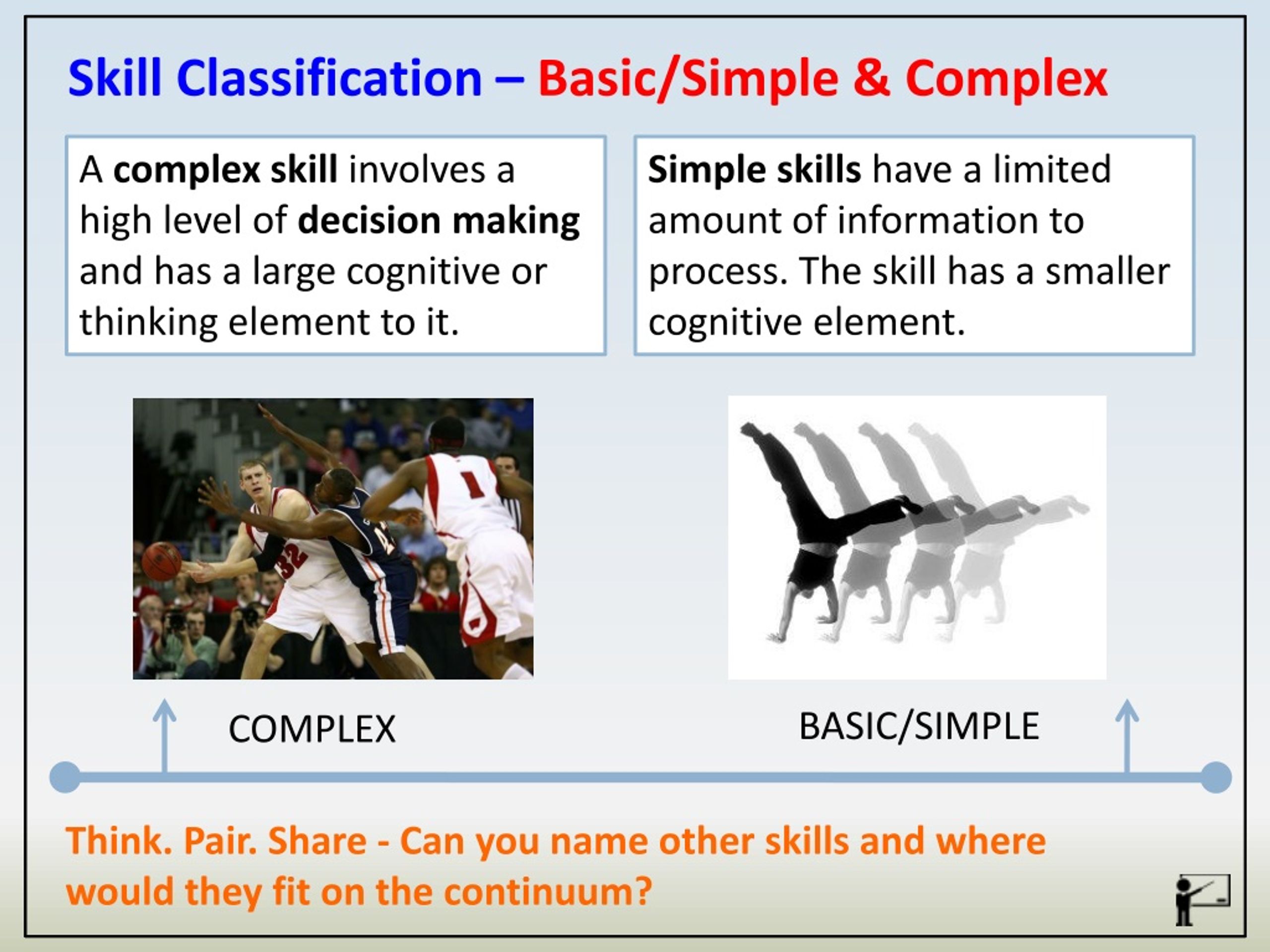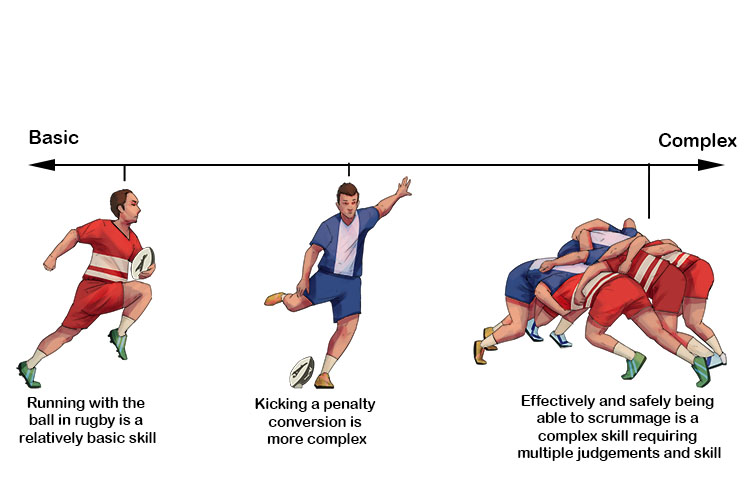Ace Tips About What Is A Complex Skill In Football

Street Performance. Ppt Download
Decoding the Beautiful Game
1. Beyond Kicking and Catching
Football. Soccer. Whatever you call it, the game seems simple enough, right? Kick the ball, run around, try to score. But peel back the layers and you'll find a symphony of skills, some more intricate than others. We're not talking about simply booting the ball downfield; we're diving into what elevates a football skill to the level of "complex." Forget the basic stuff. We're going deep today.
So, what exactly defines a complex skill in football? It's more than just difficult to execute. A truly complex skill involves a combination of factors. Think about it like a recipe; you need the right ingredients and the correct method to bake a perfect cake. In football, this means blending physical prowess, mental acuity, and tactical awareness seamlessly. It's not just about doing something well; it's about doing it well under pressure and in the right context.
A "complex skill" in football, grammatically speaking, centers around the adjective "complex." It modifies "skill," highlighting that the complexity is the key attribute we're examining. It's not just any skill, but one that demands more than just raw talent. This is crucial for the article because we're aiming to dissect what makes a skill complex, not just list skills that are hard to do.
For instance, juggling the ball a thousand times is impressive, sure. But is it complex in a game situation? Probably not. A truly complex skill is one that allows a player to make split-second decisions, adapt to changing circumstances, and create opportunities for themselves and their teammates. We are going to unwrap the gifts of complexities in football skills that makes it stand out from others.

Soccer Ball Control Exercises At Zac Ayers Blog
The Key Ingredients of Football Complexity
2. Physical, Mental, and Tactical Harmony
Let's break down those "ingredients" a bit further. First, there's the physical component. This isn't just about strength and speed, although those are definitely important. It's about agility, balance, coordination, and the ability to control your body in unconventional ways. Think about a defender making a last-ditch tackle while simultaneously staying on their feet and preventing a penalty — that's physical prowess at its finest.
Next, we have the mental aspect. This is where the real magic happens. A complex skill requires anticipation, decision-making, spatial awareness, and the ability to read the game. It's about knowing where your teammates are, where the opponents are likely to be, and how to exploit weaknesses in the defense. It's almost like a chess match played at lightning speed. Imagine a quarterback analyzing a defense in the blink of an eye and delivering a perfect pass — pure mental agility.
Finally, there's the tactical element. This involves understanding the team's strategy, the opponent's formation, and the overall flow of the game. A complex skill is one that contributes to the team's tactical goals, whether it's breaking down a stubborn defense, controlling the midfield, or protecting a narrow lead. A good example is a midfielder who can dictate the tempo of the game — slowing it down when necessary, speeding it up when opportunities arise. This requires a deep understanding of the game's nuances and the ability to make smart decisions under pressure.
The interplay between these three ingredients is crucial. You can be physically gifted, but without the mental and tactical awareness, you'll struggle to execute complex skills effectively. Similarly, you can be a tactical genius, but if you lack the physical ability to execute your ideas, you'll be limited in what you can achieve. The truly great players are those who can combine all three elements seamlessly.

PPT Skill Classification In Sports PowerPoint Presentation, Free
Examples of Complex Skills in Action
3. From Dazzling Dribbles to Surgical Passes
Okay, enough theory. Let's get practical. What are some specific examples of complex skills in football? One obvious example is dribbling past multiple defenders. This requires exceptional close control, agility, vision, and the ability to anticipate the opponent's movements. Think of Lionel Messi weaving his way through a packed defense — a masterclass in dribbling complexity.
Another example is a perfectly weighted through-ball that splits the defense and puts a striker through on goal. This requires pinpoint accuracy, vision, timing, and an understanding of the striker's run. It's not just about kicking the ball; it's about placing it exactly where it needs to be, at the precise moment, to create a scoring opportunity. A skill like this can change the game.
Then there's the art of defending — specifically, making a perfectly timed tackle to win the ball back without conceding a foul or risking injury. This requires impeccable timing, spatial awareness, and the ability to read the opponent's intentions. It's a high-risk, high-reward skill that can completely disrupt the opponent's attack. Consider a defender who consistently dispossesses opponents with clean, decisive tackles — a true defensive maestro.
Finally, let's not forget about goalkeeping. Making a diving save to deny a certain goal is a complex skill that demands exceptional reflexes, agility, courage, and positioning. It's about anticipating the shot, reacting quickly, and putting your body on the line to protect the goal. A goalkeeper who consistently pulls off incredible saves can be the difference between winning and losing.

Why Complex Skills Matter
4. The Competitive Edge
Why should you care about complex skills? Because they're what separate the good players from the great ones. In a sport where margins are often razor-thin, the ability to execute complex skills can be the difference between victory and defeat. It's about having that extra edge — that ability to do something that the opponent can't anticipate or defend against.
Complex skills also make the game more exciting to watch. Who wants to see a team that just punts the ball downfield and hopes for the best? People want to see creativity, flair, and moments of brilliance. Complex skills provide those moments — those flashes of genius that make football so captivating. They are the reason we watch and the reason we love the sport.
Furthermore, mastering complex skills can significantly improve your confidence and decision-making on the field. When you know you have the ability to execute difficult maneuvers under pressure, you're more likely to take risks, try new things, and push yourself to the limit. This can lead to even greater improvements in your overall game. It's a positive feedback loop: the better you get, the more confident you become, and the more you're willing to challenge yourself.
Imagine a scenario where your team is down by a goal in the final minutes of a crucial game. The pressure is immense. But if you've honed your complex skills — your dribbling, your passing, your shooting — you'll be better equipped to handle the situation and create a scoring opportunity. That's the power of complexity: it allows you to thrive under pressure and make a real difference when it matters most.

Football Amazing Skills And Goals At Brent Vangundy Blog
Developing Complex Skills
5. The Path to Mastery
So, how do you go about developing complex skills? It's not something that happens overnight. It requires dedicated practice, patience, and a willingness to learn from your mistakes. Start with the fundamentals — mastering the basics of passing, dribbling, and shooting. Then, gradually introduce more challenging drills and exercises that focus on developing specific aspects of complexity, such as agility, vision, and decision-making.
One effective technique is to break down complex skills into smaller, more manageable components. For example, if you want to improve your dribbling skills, start by focusing on close control and footwork. Practice dribbling around cones, changing direction quickly, and keeping the ball close to your feet. Once you've mastered these basics, you can gradually introduce more challenging scenarios, such as dribbling past defenders or navigating tight spaces.
Another important aspect of skill development is to seek feedback from coaches, teammates, and even opponents. Ask them to observe your play and provide constructive criticism. Pay attention to their suggestions and use them to identify areas where you can improve. Remember, even the best players in the world are constantly working on their skills and seeking ways to get better.
Finally, don't be afraid to experiment and try new things. Watch videos of professional players executing complex skills and try to emulate their movements. Analyze their techniques and identify the key elements that make them successful. The journey to mastering complex skills is a continuous process of learning, adapting, and pushing yourself to the limit. Embrace the challenge and enjoy the ride.

LEARN 69 FOOTBALL SKILLS 1 Hour Tutorial YouTube
FAQ
6. Your Burning Questions Answered
Q: Is there one skill that's universally considered the most complex?A: Not really! Complexity is relative. What's complex for a beginner might be routine for a pro. But skills that involve a high degree of precision, split-second decision-making, and physical coordination under pressure (like Messi's dribbling or a perfectly weighted through ball) are generally considered to be very complex.
Q: Can anyone develop complex skills, or is it just for naturally talented players?A: While natural talent can give you a head start, anyone can improve their skills with dedicated practice and the right guidance. It takes time and effort, but the results are well worth it. Focus on the fundamentals, break down complex skills into smaller parts, and be patient with yourself.
Q: What's more important: mastering basic skills or focusing on complex ones?A: You need a solid foundation of basic skills before you can even think about tackling the complex stuff. Imagine trying to build a house without a foundation — it's just not going to work. Master the fundamentals of passing, dribbling, and shooting, and then gradually introduce more challenging drills and exercises.